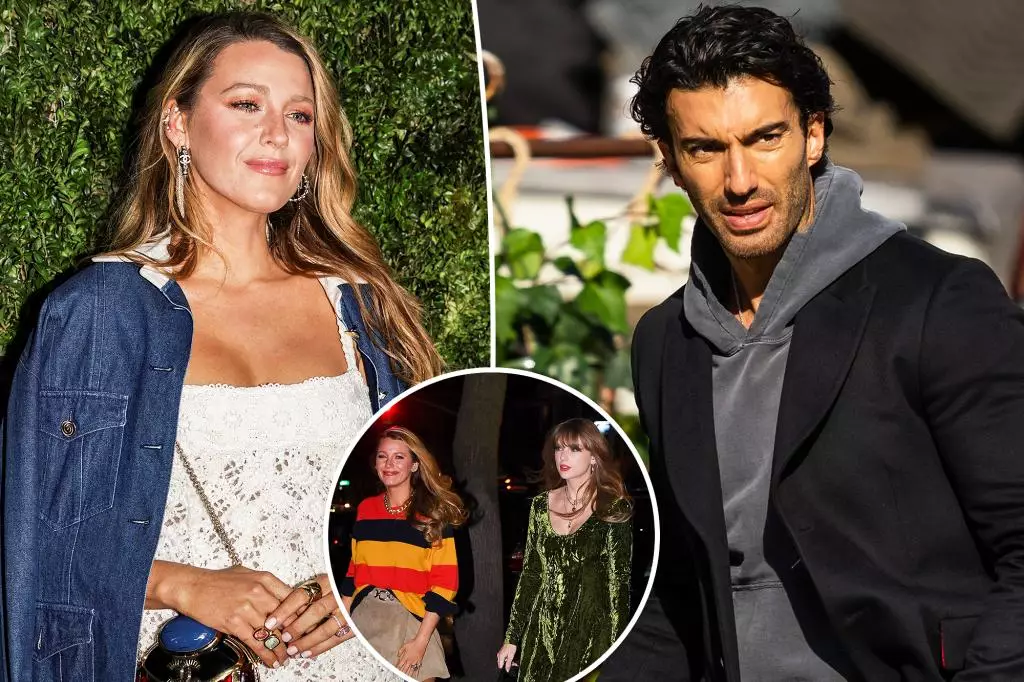In the tumultuous world of celebrity legal battles, one of the latest sagas involves Blake Lively and Justin Baldoni, emblematic of the chaotic intersection of personal relationships and public personas. Lively’s recent motion for a protective order against Baldoni raises significant questions: how far can legal entities go in their pursuit of information, particularly when it involves high-profile figures like Taylor Swift? This clash goes beyond mere legalities; it underscores the effects of public relations on legal strategy and the intense scrutiny that accompanies celebrity life.
Lively’s court filing reveals her claims that Baldoni’s attempts to gain access to her private communications with Swift are not just unnecessary but strategically manipulative. This defensive move by Lively signals an understanding that the stakes are not merely about legal standing, but also about the narrative being constructed around her and her choices. In alleging that the legal team’s inquiries into her relationship with the pop star serve a media agenda, she positions herself as a victim of an orchestrated PR strategy rather than a mere party in a lawsuit. This perception is crucial as it can shape public opinion, which is often as influential as a legal ruling.
A Tactic Rooted in Celebrity Culture
The legal maneuvering surrounding this case illuminates broader themes within celebrity culture, particularly the exploitation of relationships for tactical advantages. Baldoni’s legal team initially attempted to leverage Swift’s popularity and fanbase to bolster their position. By pulling in a figure notable for her immense cultural capital, they aimed to create a media spectacle that would pivot attention from the actual claims of the lawsuit to the drama of celebrity relationships. As Lively noted, the public association with Swift was not an innocent foray but part of a well-documented PR strategy that sought to capitalize on her fandom.
What is particularly striking in this ongoing saga is the manner in which Lively frames her friendship with Swift as not central to the lawsuit. This assertion reflects an intuitive grasp of how narratives can be shaped—asserting control over one’s story while simultaneously disavowing the public’s intrusion into private matters. The ongoing court proceedings seem to be acting as a stage where personal boundaries are continually tested, and where self-definition becomes a crucial issue. The fallout of these strategies evokes larger conversations about consent and privacy in the public sphere.
The Fallout from Failed Legal Tactics
In the wake of the judge’s dismissal of Baldoni’s countersuit against Lively and her husband Ryan Reynolds, the dynamics of this feud have taken a turn. It illustrates a significant setback for Baldoni, whose legal strategies were found lacking promptly by the court. The reported reasoning for dismissal—citing a lack of sound legal grounding—adds a layer of complexity to his approach. His legal team, given another chance to amend the claims around implied covenant breaches, must now revisit their strategy comprehensively.
The attorney for Lively has emphasized that this legal battle is less about the merits of the case and more about a media strategy aimed at using high-profile personalities as pawns. The implication is clear: by attempting to keep Swift in the limelight of this conflict, Baldoni’s team has faltered, misleadingly hoping that the star’s presence would somehow bolster their claims. This failure reflects an essential truth about modern legal battles among celebrities: the risks of intertwining personal and professional narratives can often backfire dramatically.
The Road Ahead: Implications for Public Figures
As the trial date for Lively and Baldoni’s case approaches in March 2026, the ramifications of their conflict will resonate far beyond the courtroom. The ongoing saga offers a cautionary tale for public figures—whether actors, musicians, or prominent personalities—about the balance of power in the legal and media landscapes. The interplay of personal and public narratives can empower or endanger individuals, depending on how adeptly they navigate these tumultuous waters.
For Lively, maintaining the narrative that emphasizes her autonomy and privacy in the face of aggressive legal strategies is critical not only for her case but also for her public image. Meanwhile, as this legal drama unfolds, it will undoubtedly captivate audiences and further entrench the complex dynamics between litigation, public relations, and celebrity persona in the 21st century.

